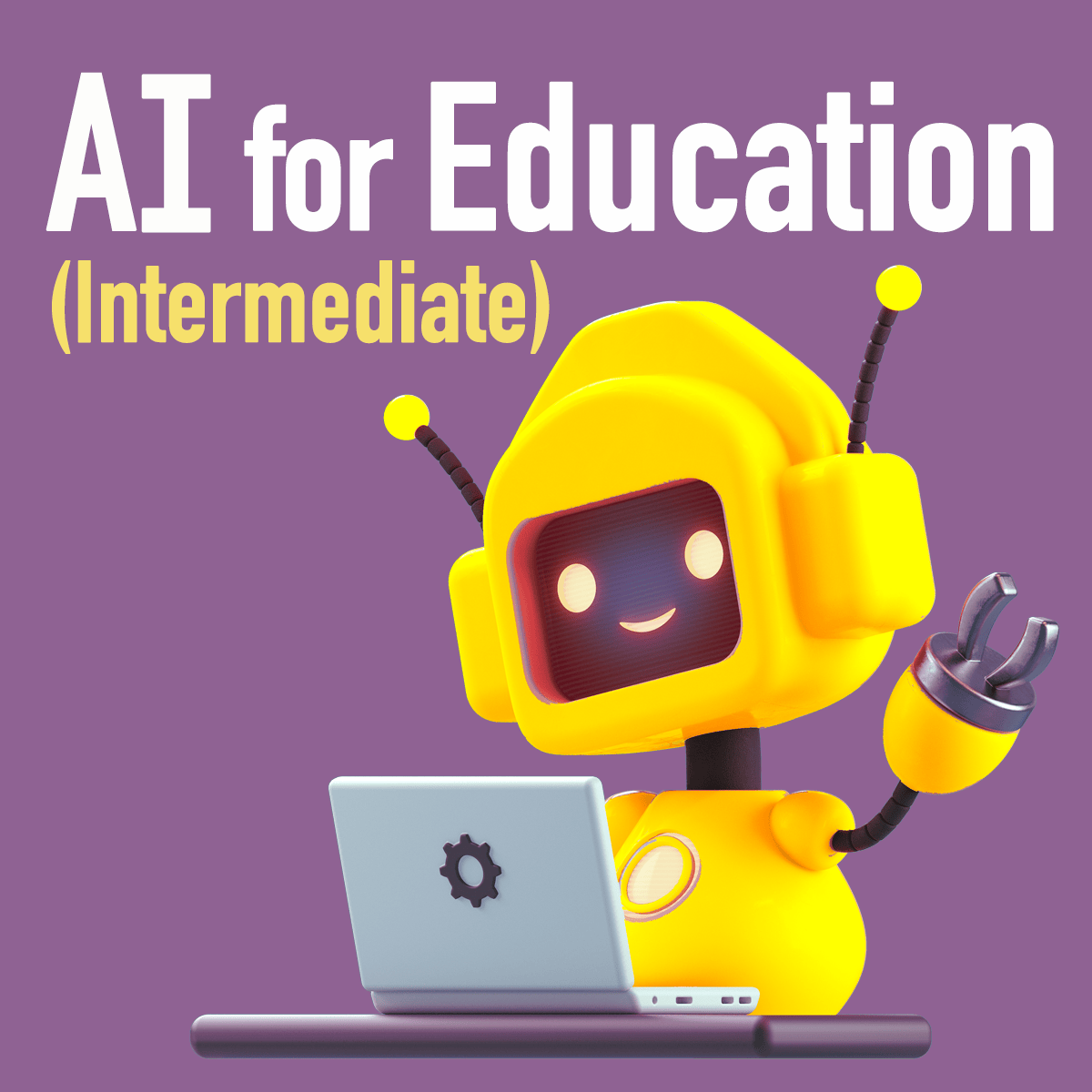
This course expands on the AI for Education (Basic) course. Participants will learn quick ways to refine prompt engineering methods for assignments and course design that can be scaled to multiple levels of educational contexts. This course further provides straightforward and practical definitions, scenarios, and prompt engineering methods with real-time demonstrations in diverse educational learning environments.
Read more
This course expands on the AI for Education (Basic) course. Participants will learn quick ways to refine prompt engineering methods for assignments and course design that can be scaled to multiple levels of educational contexts. This course further provides straightforward and practical definitions, scenarios, and prompt engineering methods with real-time demonstrations in diverse educational learning environments.
This course expands on the AI for Education (Basic) course. Participants will learn quick ways to refine prompt engineering methods for assignments and course design that can be scaled to multiple levels of educational contexts. This course further provides straightforward and practical definitions, scenarios, and prompt engineering methods with real-time demonstrations in diverse educational learning environments.
Participants will be provided tested methods for prompting an AI Assistant, such as GPT to yield useful, relevant, accurate, and ethical outputs. Learners will gain a clear understanding of how to collaborate with an AI Assistant and how to encourage students to do so in ethical ways. Knowing how to describe and collaborate with AI Assistants effectively and rhetorically is a vital skillset to successfully engage with students in all types of learning environments, from secondary to college levels.
This course is a beginning step in learning these skills.
What's inside
Syllabus
Good to know
Save this course
Activities
Review AI Concepts
Show steps
Review fundamental AI concepts to strengthen your understanding before starting the course.
Browse courses on
AI Concepts
Show steps
-
Read introductory articles or textbooks on AI concepts.
-
Watch online videos or tutorials on basic AI algorithms.
-
Complete practice exercises or quizzes to test your comprehension.
Explore GPT-3 Tutorials
Show steps
Follow guided tutorials to enhance your understanding of GPT-3's capabilities and applications.
Browse courses on
GPT-3
Show steps
-
Identify reputable online platforms or resources offering GPT-3 tutorials.
-
Choose tutorials that align with your learning objectives.
-
Follow the instructions and complete the exercises provided in the tutorials.
-
Experiment with the GPT-3 API or playground to apply your learnings.
Practice Prompt Engineering Exercises
Show steps
Engage in repetitive prompt engineering exercises to refine your skills and improve your ability to collaborate with AI assistants.
Browse courses on
Prompt Engineering
Show steps
-
Find online resources or platforms that offer prompt engineering exercises.
-
Select exercises that focus on specific tasks or domains relevant to your course.
-
Practice writing prompts that yield accurate, relevant, and useful outputs.
-
Review your results and identify areas for improvement.
One other activity
Expand to see all activities and additional details
Show all four activities
Design an AI-Powered Learning Activity
Show steps
Create an original AI-powered learning activity to demonstrate your understanding of AI's potential in educational settings.
Browse courses on
AI in Education
Show steps
-
Identify an educational topic or skill that can be enhanced using AI.
-
Design an activity that leverages an AI assistant or tool to support learning.
-
Develop a plan for implementing and evaluating the activity.
-
Create supporting materials, such as instructions or resources.
Review AI Concepts
Show steps
Review fundamental AI concepts to strengthen your understanding before starting the course.
Browse courses on
AI Concepts
Show steps
- Read introductory articles or textbooks on AI concepts.
- Watch online videos or tutorials on basic AI algorithms.
- Complete practice exercises or quizzes to test your comprehension.
Explore GPT-3 Tutorials
Show steps
Follow guided tutorials to enhance your understanding of GPT-3's capabilities and applications.
Browse courses on
GPT-3
Show steps
- Identify reputable online platforms or resources offering GPT-3 tutorials.
- Choose tutorials that align with your learning objectives.
- Follow the instructions and complete the exercises provided in the tutorials.
- Experiment with the GPT-3 API or playground to apply your learnings.
Practice Prompt Engineering Exercises
Show steps
Engage in repetitive prompt engineering exercises to refine your skills and improve your ability to collaborate with AI assistants.
Browse courses on
Prompt Engineering
Show steps
- Find online resources or platforms that offer prompt engineering exercises.
- Select exercises that focus on specific tasks or domains relevant to your course.
- Practice writing prompts that yield accurate, relevant, and useful outputs.
- Review your results and identify areas for improvement.
Design an AI-Powered Learning Activity
Show steps
Create an original AI-powered learning activity to demonstrate your understanding of AI's potential in educational settings.
Browse courses on
AI in Education
Show steps
- Identify an educational topic or skill that can be enhanced using AI.
- Design an activity that leverages an AI assistant or tool to support learning.
- Develop a plan for implementing and evaluating the activity.
- Create supporting materials, such as instructions or resources.
Career center
Instructional Technology Specialist
Educational Software Developer
Curriculum Developer
Learning Experience Designer
Instructional Designer
Education Consultant
Higher Education Administrator
Educational Researcher
Teacher
Education Policy Analyst
Education Program Manager
Nonprofit Program Manager
Data Analyst
Software Engineer
Artificial Intelligence Engineer
Reading list
Share
Similar courses
OpenCourser helps millions of learners each year. People visit us to learn workspace skills, ace their exams, and nurture their curiosity.
Our extensive catalog contains over 50,000 courses and twice as many books. Browse by search, by topic, or even by career interests. We'll match you to the right resources quickly.
Find this site helpful? Tell a friend about us.
We're supported by our community of learners. When you purchase or subscribe to courses and programs or purchase books, we may earn a commission from our partners.
Your purchases help us maintain our catalog and keep our servers humming without ads.
Thank you for supporting OpenCourser.


